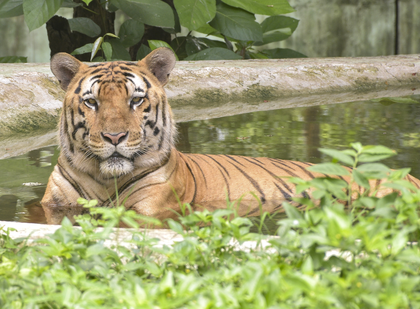On International Tiger day, TN's Mudumalai Tiger Reserve records 28 pc rise in feline population
By IANS | Updated: July 29, 2025 11:14 IST2025-07-29T11:07:39+5:302025-07-29T11:14:34+5:30
Chennai, July 29 Marking a significant achievement on International Tiger Day (July 29), the Mudumalai Tiger Reserve (MTR) ...

On International Tiger day, TN's Mudumalai Tiger Reserve records 28 pc rise in feline population
Chennai, July 29 Marking a significant achievement on International Tiger Day (July 29), the Mudumalai Tiger Reserve (MTR) has reported a 28 per cent rise in its big cat population for 2024–25.
The number of tigers has increased from 129 in 2023–24 to 165, delighting wildlife conservationists and forest officials alike.
The impressive growth is attributed to a combination of dedicated anti-poaching efforts, effective habitat restoration, and the large-scale removal of invasive plant species.
MTR, which spans 688.59 hectares, comprises 321 hectares of core zone and 367.59 hectares of buffer zone.
Within its core area, the presence of nearly 85 swamps plays a vital role in supporting wildlife by providing essential water sources.
Forest Department officials highlighted that the unchecked increase in density of Lantana camara, an invasive woody shrub that poses a serious threat to these swamp ecosystems.
"If not removed, Lantana would have overtaken the swamps and destroyed key habitats," an official said.
Acting on a directive from the Madras High Court, forest teams - with active participation from indigenous communities - undertook a large-scale clearance of Lantana camara across 725 hectares in four core forest ranges during 2024–25.
The cleared biomass was repurposed into eco-friendly briquettes by tribals from the Kattu Naicker, Kurumba, Malasar, and Paniya communities, with six tonnes produced so far, providing both conservation gain and livelihoods.
A senior MTR official noted that the removal of Lantana allowed sunlight to reach the forest floor, encouraging the natural regrowth of native grass species. This, in turn, has boosted prey density, a key factor in the rise of tiger numbers.
"Anti-poaching activities and habitat improvement go hand-in-hand. Increasing prey base directly supports predator populations," the official said. MTR currently operates 36 Anti-Poaching Camps (APCs), with plans underway to establish another in collaboration with tribal communities.
The reserve also supports other key species, including leopards, dholes, hyenas, and vultures - the latter playing a crucial role in scavenging and maintaining ecosystem health.
The tiger population surge at Mudumalai is being hailed as a model for conservation across the country.
On this International Tiger Day, the reserve stands as a testament to the impact of sustained, community-driven conservation efforts.
Disclaimer: This post has been auto-published from an agency feed without any modifications to the text and has not been reviewed by an editor
Open in app